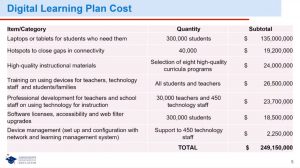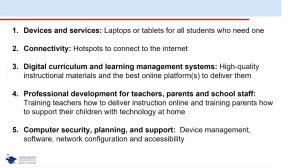Jayden Woullard, a rising senior at Murrah High School in Jackson, said she was mid-shift at Whataburger when Gov. Tate Reeves declared a state of emergency due to COVID-19. Woullard told her coworkers and boss that she would come back to work when everything settled down.
“It never calmed down,” Woullard said. That same weekend, Woullard was scheduled to take the SAT and constantly checked for a notification that the test had been cancelled.
“I kept on thinking, ‘OK, maybe school will open up because the SAT isn’t cancelled,’” Woullard told the Mississippi Free Press. However, on March 19 when the Mississippi Department of Education confirmed that public schools across the state would be shut down until at least April 17, Woullard said she accepted that the rest of her junior year would require digital learning.
So far, online earning is a new reality for Mississippi public-school students, and state precautions imply that it may not be going away anytime soon.

‘This Is An Equity Issue’
During the Mississippi State Board of Education’s monthly meeting May 21, via livestream, Superintendent Carey Wright announced MDE’s decision to create a statewide digital learning plan for K-12.
MDE drafted the plan because Wright believes the state’s digital-educational capabilities are lacking. “Everybody being at home and learning digitally has shown a light on something that we’ve all known, which is that some children have connectivity, and others do not,” Wright said.
MDE’s digital learning plan for K-12 consists of six parts: devices and services; connectivity; digital curriculum and learning management services; professional development for teachers, parents and school staff; computer security, planning and support; and increase in telehealth and teletherapy locations.
Wright said MDE had the plan “vetted” with the Mississippi Alliance for Nonprofits and Philanthropy. “These are the biggest funders across the state, and we wanted someone to tell us what this would look like and how much it would cost,” she said.
Costs for the digital learning plan are currently at an estimated total of $249,150,000 with $135,000,000 of this budget going toward “laptops and tablets for students who need them,” the plan’s official outline says. All students and teachers will receive “training on using devices,” which will cost $26,500,000, and MDE will create 40,000 hotspots to “close gaps in connectivity,” a cost of $19,200,000.
“This is an equity issue,” Wright said. “It’s not children’s fault that they don’t have connectivity.”
At-Large Board Representative Sean Suggs, president of Toyota Motor Manufacturing Mississippi Inc., asked whether teachers in need of laptops and tablets would be included in the plan’s budget.
“I think so,” Wright responded, adding that she had scheduled a meeting next week with all of Mississippi’s superintendents so the agency could determine “how many devices” schools have and “how old they are,” Wright said.
Funding for the plan will come from the $1.25 billion the state has received in CARES Act funds, from which MDE seeks $250 million for the digital learning plan, a May 13 news release says.
MDE must spend the budget’s funds by Dec. 31. “The federal government has not given us much time where this is concerned,” Wright said.

Plans for in-classroom learning versus digital learning for the upcoming school year and summer remain unclear, but Wright said State Health Officer Dr. Thomas E. Dobbs III “reiterated more than once that social distancing and wearing masks,” in addition to limiting the number of children in one room, will continue throughout the summer.
Felicia Sheriff, another rising senior at Murrah, said she was not a fan of the online schooling the students were suddenly thrust into after spring break. “I wasn’t able to actually get the one-on-one learning with my teachers,” Sheriff said. “I was learning in the classrooms, but when I’m just having to read and write down examples, I’m not learning.”
Plus, the necessary social components of high school were taken away because of digital learning, Sheriff told the Mississippi Free Press. “When you’re going through high school, you’re finding yourself, and so you’re also not able to get that experience,” she said.

‘Where Was All This Money When We Needed It?’
Southern Court District State Board representative John R. Kelly asked Wright on May 21 if the platforms districts will use for digital learning management would be products of MDE or from private companies.
Wright provided Google Classroom and Canvas as examples of the “off-the-shelf packages” that she intends for Mississippi’s K-12 schools to use for digital learning. However, Wright said the pandemic “exposed the fact that not every district has a learning management system.”
The superintendent added that she believes the Mississippi executive branch is being supportive, and called the state support unparalleled. “This is a powerful moment,” Wright said.
“We’re never going to have an opportunity with this kind of influx of money again,” she added, referring to the federal funds.

Sheriff and Woullard both found MDE’s K-12 digital learning plan to be thorough and the costs listed impressive, especially considering the shortfalls of funding before COVID-19.
“That’s a lot of money,” Woullard said. “Where was all this money when we needed it?”
Woullard added that the plan’s indication that only 300,000 students would get a laptop was lacking in scope. MDE’s enrollment statistics page show that 465,913 students attended public school during the 2019-2020 school year, meaning 165,913 students are not included in the plan’s projected cost and supply numbers.
“Students’ circumstances can change to where they have a laptop, but then they need one,” Woullard said. “So (MDE) should just make it to where everyone gets one.”
Sheriff said she has heard many accounts of elementary-age students not having access to WiFi or a device with WiFi capabilities, and because of that she feels hopeful about MDE’s K-12 plan’s commitment to connectivity for students.
“Some of my sister’s friends were not able to access computers because of their financial situations, but the school offered them packets,” Sheriff said. “But the packets were an overload, 70 pages, and that’s unrealistic for an elementary student at the end of the school year.”
‘Blowing Spit Everywhere’
Safety is also top of mind for the Murrah students. Woullard said she is concerned about the Murrah dance team’s intentions to go back to practice June 1, per the Mississippi High School Activities Association’s COVID-19 guidelines, because of how they sometimes practice alongside the band.
“They’ll be in tight rooms blowing instruments and blowing spit everywhere,” Woullard said.
MHSAA’s COVID-19 guidelines are not requiring participation at summer practices. “All practices, workouts, skill development, weightlifting, conditioning and rehearsals shall be considered voluntary for student athletes and activities participants,” the provisions read.
Sheriff said she doesn’t think Mississippians are taking the virus seriously enough, and that a second wave is inevitable.
“I already know more people are going to get the virus because kids are already trying to set up parties on social media,” she said. “I really don’t even think that restaurant dining should have opened back up.”
Sheriff works in a Byram restaurant, south of Jackson, where none of the staff is wearing masks or gloves, she said.
At the MDE board meeting, the superintendent acknowledged that all public-school stakeholders are suffering in a variety of ways. “One thing that’s come through is that a lot of teachers, parents and students are struggling with social and emotional issues,” Wright added. “This is everybody’s issue, and this isn’t just a K-12 issue.”










